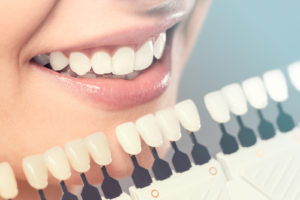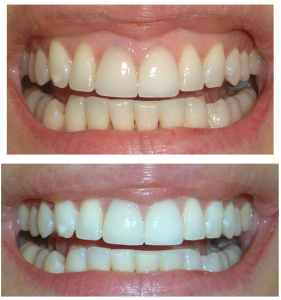Whitening
Many of our patients ask us about tooth whitening. Everybody wants a bright, white, Hollywood smile. However, there are some important things to know about teeth whitening before you go ahead.
There are several different teeth whitening options available, which can make it difficult to choose which one is right for you. We have broken down the main options below and included the positives and negatives of each.

Whitening Toothpaste
With so many brands and types available, all boasting great results, teeth whitening toothpastes can seem appealing. While they may achieve a very minimal result over a long period of usage, it’s important to note that the strength of peroxide (bleaching agent) in teeth whitening toothpastes is extremely low. This means it can’t whiten teeth very successfully, but may have minimal results over time.
Supermarket/Chemist at Home Whitening Gel Systems:
Similarly to whitening toothpastes, at home whitening systems bought from chemists or supermarkets have a significantly lower strength of peroxide than dentally administered alternatives. Many teeth whitening systems use a plastic mouth-guard type tray, and a tube of teeth whitening gel. Spreading the gel around the tray, then putting the tray on your teeth, can whiten your tooth’s enamel. However the negatives of these cheaper alternatives are that your gums and cheeks can be chemically burnt by the peroxide and become very irritated and sore. Swallowing peroxide is also more likely with these methods. While you may achieve some results, they can be unpredictable and less safe and effective when compared with dental alternatives.
Dentist Issued At Home Whitening Systems:
Dental professionals can administer take-home teeth whitening systems which include a custom fitted whitening tray that sits on your teeth – moulded perfectly to your mouth. These specialist trays all the bleaching gel to sit on the tooth’s surface, without spilling over onto the gum and cheeks. The bleaching gel that can be administered by dental professionals it a higher concentrate, meaning better results in less time. Some take-home whitening systems suggest over-night application, while others can be done in 45-60 minutes per day.
In chair whitening will give patients the best results in the least amount of time, as the bleaching gel used is highly concentrated and works rapidly on teeth. The practitioner will clean your teeth, apply a barrier film to protect your gums, and finally apply the bleaching gel to your teeth. After either 60, 90 or 120 minutes (depending on the particular system used), your teeth will be sparkly and white.
It’s important to note that all teeth whitening can cause sensitivity to hot and cold. If you are undergoing whitening treatment, it’s best to avoid foods and drinks that are heavily coloured – such as red wine, coffee, curries and tomato based sauces.


Your article left me with a desire to learn more. If you’re hungry for additional resources, click here for a curated list of books, podcasts, and videos on the subject.
Thank you for this educational blog post! Teeth whitening is often done using a peroxide gel. This gel is brushed into the teeth with an applicator or sprayed on with a brush to obtain the desired results, then left on for varying amounts of time.
Teeth whitening is often done using a peroxide gel. This gel is brushed into the teeth with an applicator or sprayed on with a brush to obtain the desired results, then left on for varying amounts of time. Aside from that, there are a slew of other at-home remedies for pearly whites and healthy teeth. One of them is the use of lemon juice and baking soda to remove stains from the teeth.
There are a few additional at-home remedies that can help you obtain white, healthy teeth.